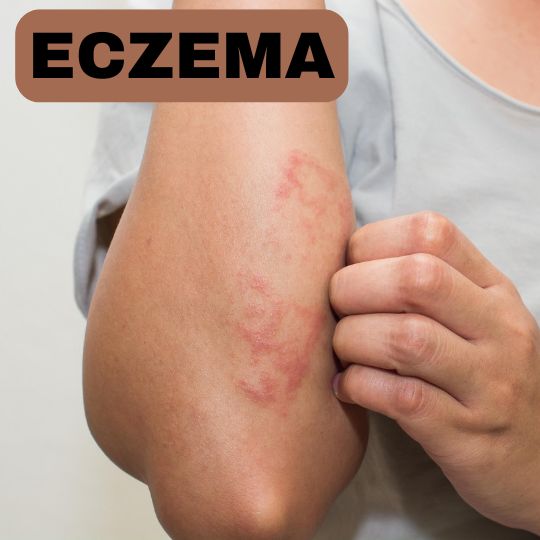
Eczema, a chronic skin condition characterized by inflammation and itching, affects millions worldwide. While there’s no cure, managing symptoms and flare-ups is possible through various natural remedies and lifestyle changes.
Introduction
Understanding eczema is crucial for effective management. It’s often linked to genetics and environmental factors and manifests as dry, itchy patches on the skin. Triggers vary from person to person, making identifying and addressing them essential.
Identifying Triggers
Common triggers
Certain factors like allergens, irritants, and weather conditions can exacerbate eczema symptoms. These may include pet dander, pollen, harsh soaps, and extreme temperatures.
Personal triggers
In addition to common triggers, individuals may have unique triggers. These could range from certain fabrics or foods to stress or hormonal changes.
Lifestyle Changes
Making lifestyle adjustments can significantly alleviate eczema symptoms.
Diet adjustments
Eliminating potential trigger foods such as dairy, gluten, and processed sugars can help reduce inflammation. Incorporating anti-inflammatory foods like fatty fish, leafy greens, and probiotics can also benefit skin health.
Stress management
Stress is known to worsen eczema symptoms. Stress-reducing activities like yoga, meditation, or deep breathing exercises can help manage flare-ups.
Skincare routine
Using gentle, fragrance-free skin care products and avoiding hot baths or showers can prevent further irritation. Moisturizing regularly with hypoallergenic creams or ointments helps maintain skin hydration.
Natural Remedies
Numerous natural remedies offer relief from eczema symptoms.
Moisturizers
Moisturizers containing ingredients like ceramides, shea butter, or glycerin help soothe dry, irritated skin and strengthen the skin barrier.
Oatmeal baths
Oatmeal baths can relieve itching and inflammation. Colloidal oatmeal, rich in antioxidants and anti-inflammatory properties, calms irritated skin.
Coconut oil
Coconut oil’s antimicrobial and moisturizing properties make it an effective natural remedy for eczema. Applying it to affected areas helps soothe itching and reduce inflammation.
Aloe vera
Aloe vera gel, known for its cooling and anti-inflammatory properties, can alleviate eczema symptoms when applied topically. It moisturizes the skin and reduces redness and irritation.
Honey
Honey’s antibacterial and anti-inflammatory properties make it beneficial for eczema-prone skin. Applying raw honey to affected areas helps soothe itching and promote healing.
Herbal Supplements
Certain herbal supplements may complement eczema treatment.
Evening primrose oil
Evening primrose oil, rich in gamma-linolenic acid (GLA), has anti-inflammatory properties that, when taken orally, may help reduce eczema symptoms.
Fish oil
Omega-3 fatty acids found in fish oil have anti-inflammatory effects, potentially reducing eczema severity and frequency of flare-ups.
Probiotics
Probiotics, beneficial bacteria that support gut health, may improve eczema symptoms by modulating the immune system and reducing inflammation.
Conclusion
While eczema can be challenging to manage, natural remedies and lifestyle changes offer relief without the side effects of conventional treatments. Individuals can effectively manage eczema and enjoy healthier skin by understanding triggers, adopting a healthy lifestyle, and incorporating natural remedies.
FAQs
- Are natural remedies safe for all types of eczema? Natural remedies can vary in effectiveness depending on the individual and the type of eczema. It’s essential to consult with a healthcare professional before trying any new treatment.
- How long does it take to see results from natural remedies? Results may vary from person to person. Some individuals may experience relief shortly after starting treatment, while others may require more time. Consistency and patience are key.
- Can I use natural remedies alongside prescribed medications? Yes, many natural remedies can complement conventional treatments for eczema. However, it is crucial to discuss these with your healthcare provider to ensure compatibility and safety.
- Are there any side effects associated with natural remedies? While natural treatments are generally considered safe, some individuals may experience allergic reactions or skin irritation. It’s essential to test a small skin area before widespread use and discontinue use if any adverse effects occur.
- Can children use natural remedies for eczema? Natural remedies can be suitable for children with eczema, but it’s essential to consult with a pediatrician before starting any treatment regimen.






